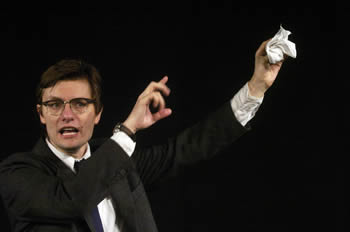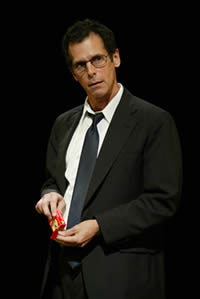
Anatomy of Abandonment
By Caridad Svich
Thom Pain (based on nothing)
By Will Eno
DR2 Theater
103 E. 15th St.
Box office: (212) 239-6200
Will Eno's Thom Pain (based on nothing)
opened in February 2005 at the DR2 Theater off of Union Square,
starring downtown theater and indie film star James Urbaniak under
Hal Brooks's direction. In a theater scene that has lately been
dominated by revivals, the lightest of upper-middle-class comedies,
and a few Big Idea-laden history plays, Thom Pain is
a resolutely ahistorical, deeply astringent and purposefully odd
solo piece. It has nevertheless sustained an open run Off-Broadway
at a time when the harsh economics of theater have forced many
a promising show to close, and it has even weathered the precarious
challenge of changing solo actors (T. Ryder Smith replaced James
Urbaniak on September 5th). What is it about this deceptively
slim text that has continued to defy critical description while
garnering praise and attracting audiences?
Thom Pain opens with a figure
in darkness. A cigarette is lit, put out and lit again. Stage
light comes up in due course. Yet Thom will remain throughout
the evening very much in the dark to us (and to himself), alternately
inaccessible and transparent as air. Barely recovering from an
intense love affair, Pain exhibits all the snarling, venomous
badinage of a spurned lover, and all the painfully (pun intended)
myopic isolation that comes from being deserted, cast off, and
abandoned to the unclear whims of a chaotic, loveless universe.
Pain, the insignificant schmo, is caught in a Sisyphean routine
of wanting greatness in his life and knowing it can never be achieved,
of wanting to tell a profound story but getting waylaid by distractions
and minor details that only make him stop and not want to tell
anymore.
I disappeared in her and she, wondering
where I went, left. It's not clear what happened exactly. So
you just try to…
Pause.
Do you like magic? I do. I think. It's
fairly ambivalent, this love of mine.
Pause.
Once a moth was flying around my room.
I was afraid. A yucky flapping moth. And me. It all had some
effect, I'm sure. Thank you very much. End of rumination.
A fragment of a fragment, a self-described
nobody, Pain is a figure easily ridiculed and by the same token,
reviled. Similar to other classically ascetic American characters,
like Melville's Bartleby the Scrivener -- characters that go against
the ingrained U.S. archetypes of the Yankee/cowboy and the dandy
-- Pain is insular and contemptuous of others, a loner without
the requisite high Romantic streak of yearning and melancholy.
Pleasure is almost anathema to this nobody among nobodies, this
loser slacker drifting through the ardent episodes of his bored
little life. He is filled with rage, yet too self-aware to think
it can be put to any good use. He is a comedian playing to an
audience that he will never "kill," in comic parlance. In the
eternally (metaphorically) bare music-hall, Pain delivers his
schtick (as Osborne's Archie knowingly did in The Entertainer)
to a laugh he will cut short with a verbal slap-in-the-face.
He holds the handkerchief up.
Behold. Consider. Use your head and imagine
this is a brain. Or, the mind. There it is, in the skull of
a boy still in the womb, battleship gray and growing, folding
over itself, turning, as he kicks his way into the world. …
Such a feeling life, such sensation, yes? Then pile the words
on top. And watch them seep down. Think of it. The brain and
the mind. All that up there. Married, happily or not. Imagine.
Pause.
Or just think about snot. Imagine that
this is a handkerchief. And that I just blew my nose into it.
But surprisingly -- and this is Eno's sly
brilliance as a writer -- the hate-filled Pain begins to ingratiate
himself just a little to his audience. His ambiguous relationship
to the purity and miracle of life's joys sparks through his vitriolic
stand-up rant/sermon and catches even him by surprise. Moving
slightly past the distress of being left by his lover, Pain does
not entirely embrace life by play's end. A wary trust, though,
is won by his simply trying to sort out his non-story, and by
offering it to others in the intimate, exposing confines of a
theater.
Maybe someone is waiting. Please be
someone waiting. I'm done with this. Important things will happen,
now. I promise. … I know this wasn't much, but let it be enough.
Do. Boo. Isn't it great to be alive?
It would be misleading, of course, to say
that Thom Pain (based on nothing) is a cozy life-affirming
treat, or that its passage from dark to darkish light is conventionally
drawn. Eno is too sardonic a writer, too aware of life's charade,
to aim higher. In this sense, he is clearly in the post post-modernist
line of novelists like Dave Eggers: a non-believing believer who
wishes for something grand but cannot fully express it because
grand schemes don't amount to much anymore. It's best to simply
disappear in a climate riddled with fear: to be the non-musical
"Mr. Cellophane." However, Pain can't stop trying, in spite of
himself.
Do me a favor. If you have a home, when
you're home, later, avoiding your family, staring at the dog,
and they ask you where you've been, please just don't say that
you were out somewhere watching someone being clever, watching
some smart-mouth nobody working himself into some dumb-ass frenzy.
Please say instead…that you saw someone who was trying. I choose
the word with care. I'm trying. A trying man. A feeling thing,
in a wordy body. Poor Thom's a-trying.
Like Beckett's Molloy, Thom Pain lives
in a strange, mysterious world where the precision of language
is the only tool left to describe life's torment. It is apropos,
then, that Eno's voice as a writer, especially in this play, has
connected with his audiences so strongly. In this piece, Pain
is an unflattering reflection of the contemporary spirit: alone,
almost virtual in appearance (barely there), alternately retreating
and abrasive in manner, distrustful, riddled with fear, and aware
that he is merely a toy in the machinations of a random, violent
world. Effectively similar to the lead role in Mike Leigh's classic
1990s film Naked, played to staggering, heartbreaking
perfection by David Thewlis, Pain is a Hamlet bereft of a tragedy
to contain him. There is no vengeance here, no kingdom to be won
and no ghosts calling for remembrance: only loneliness and more
loneliness, and stunted isolation. Whereas Leigh in his film charted
an anatomy of the tragic in the contemporary individual (indeed,
for Leigh, the depth and charge of classical tragedy is possible
in the isolated urban landscape), Eno charts the anatomy of abandonment.
Who am I, now, and what difference does
it make? … She hurt me. I bled in the night. I hurt her. I wasn't
anywhere. Then I was in love. Now I'm here. … I did everything
in fear. What was I so afraid of? I had promise. I don't have
anything anymore.
Depth is hinted at but surface keeps claiming
Pain, as surface and the simulation of the real, the mythic presence
of reality, has captured many in the modern predicament. Post-Baudrillard's
theories, Pain is a figure virtualized and almost incapable of
keeping a tangible object or storyline in view. The breakdown
of breaking down is all this abandoned non-prophet can call his
own.  Eno
pokes fun at the elemental state of his anti-hero, but also keeps
trying to connect him to the natural world, the world he has abandoned,
in effect, and from whose eco-system he has been cut off. The
disembodied life that Pain lives, and that Eno posits many of
us live, has stripped him/us of not only experience but also the
ability to connect experiences and ideas to each other. Agonizing
over his idealized lover, Pain, by virtue of who he is and the
specifically Anglo-American, vaguely New England landscape from
which he has been drawn, can only see microscopically. The bigger
picture eludes him. The bite-size samples of his admittedly sorry
little life are all he can barely hold onto. He is like an X-ray
negative. And his sort of pain, which U.S. culture is addicted
to in a media driven by tabloid tales of trauma and distress,
is what we want more than anything. Even if it is "petty" pain.
Eno
pokes fun at the elemental state of his anti-hero, but also keeps
trying to connect him to the natural world, the world he has abandoned,
in effect, and from whose eco-system he has been cut off. The
disembodied life that Pain lives, and that Eno posits many of
us live, has stripped him/us of not only experience but also the
ability to connect experiences and ideas to each other. Agonizing
over his idealized lover, Pain, by virtue of who he is and the
specifically Anglo-American, vaguely New England landscape from
which he has been drawn, can only see microscopically. The bigger
picture eludes him. The bite-size samples of his admittedly sorry
little life are all he can barely hold onto. He is like an X-ray
negative. And his sort of pain, which U.S. culture is addicted
to in a media driven by tabloid tales of trauma and distress,
is what we want more than anything. Even if it is "petty" pain.
That audiences will stick it out for a
little over an hour with this figure in the dark is testament
to Eno's captivating, enigmatic dramatic prose and T. Ryder Smith's
oddly bracing, broken charm and expert musicality as a performer.
Smith's darkly quirky, wry persona is both warmer and more mysterious
than Urbaniak, who played (also brilliantly) a dry, chilly, irony-laden
sad-sack. The drifting, elusive non-story of Thom Pain is now
less stand-up than the shaky ruminations of a distraught abandoned
lover. Indeed, revisiting Eno's remarkable play illuminates the
love-hate relationship Pain has with himself and the world. Beneath
a veil of anonymity, Pain questions civilization and the landscape
in which humans pattern their lives. Alert to culture's unending
ambiguity, Pain refuses answers. It is our gain that Eno has invented
such a misanthropic figure for our times.
